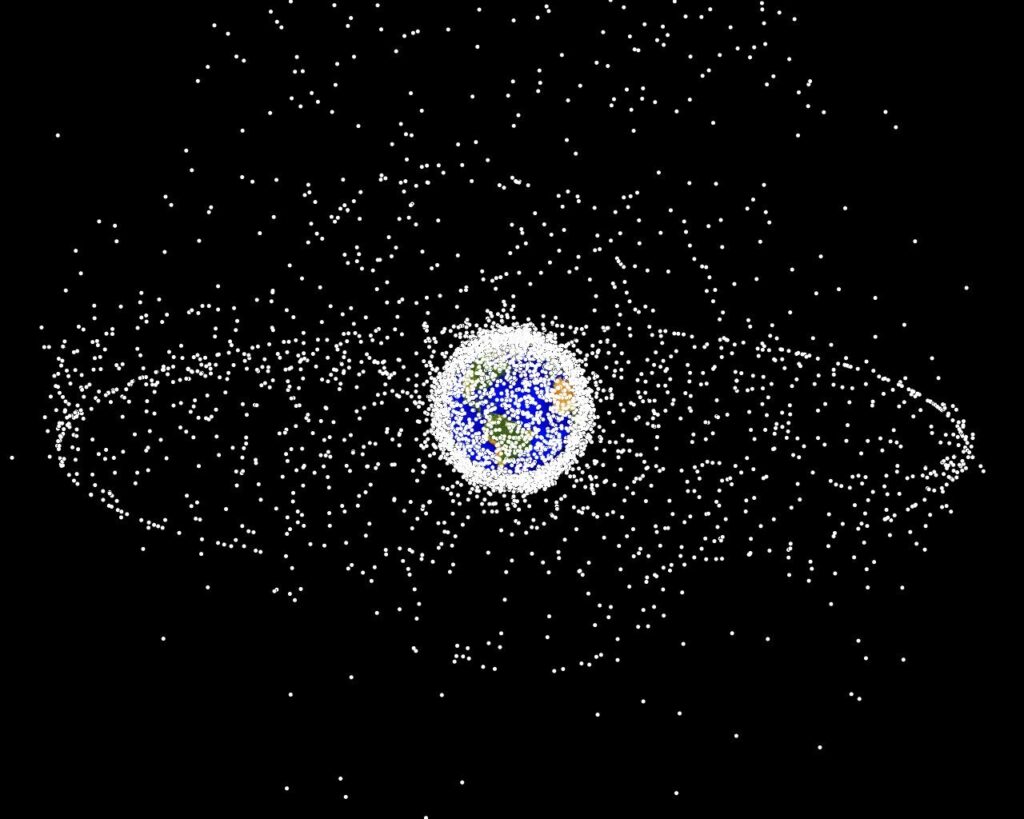
“A computer-generated image of objects in Earth orbit being tracked. Approximately 95% of the objects in this illustration are orbital debris, i.e., not functional satellites. The dots represent the current location of each item. The orbital debris dots are scaled according to the image size of the graphic to optimize their visibility and are not scaled to Earth.” Credit: NASA.
By James Myers and Mariana Meneses
With so much of the essential technology we depend on today relying on satellites orbiting the Earth, including the internet and global navigation systems, there is growing realization that new rules are required for space governance.
While concerns over the weaponization of space have existed since the 1950s, and some treaties are already in place, new issues like the commercialization of space are rapidly emerging as potential flashpoints.
At the same time, there is renewed interest around the world in space exploration, as China, India, the European Union, and most recently Japan have now achieved uncrewed landings on the Moon, like Russia before them.
While the United States is the only nation to have landed a human on the Moon, there is growing private interest in exploring the Moon and space for resources. In fact, two companies, one Israeli and the other Japanese, have achieved Moon landings for commercial purposes. Many others are developing technologies to make spaceflight more economic and accessible, even for space tourism which only a few wealthy individuals have enjoyed to date.
The reusable rockets of private company SpaceX have contributed to a significant reduction in the cost of delivering payloads into space. NBC News reported that “Companies that once had to pay hundreds of thousands of dollars to put a satellite into orbit can now do the same for a fraction of that price. Smaller satellites and lower launch costs mean startups and students can sometimes launch projects for just a few thousand dollars.”
In fact, SpaceX now has a constellation of over 5,500 satellites orbiting Earth, with more being launched almost daily, for its Starlink service. Starlink now beams the internet to over 2 million subscribers in 71 countries, and is especially important in war zones and areas where land-based internet is prohibitively expensive or unavailable.
A Worrying Increase in Space Junk
With so much technology orbiting the planet, space debris, or space junk, is a pressing issue for several reasons. The continuous launch of satellites, spacecraft, and rockets has led to a steady increase in debris, posing a threat to functioning satellites and spacecraft. Even small fragments can cause significant damage when they collide at high speeds.
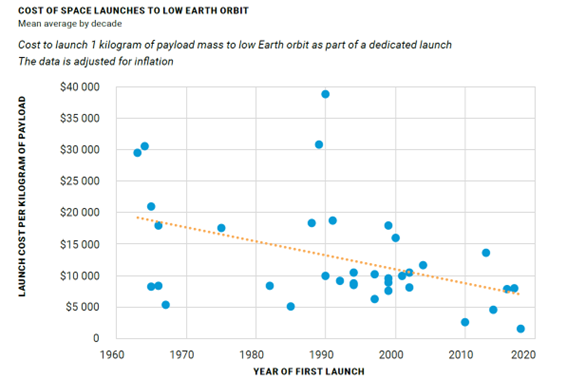
The significant reduction in the cost of launching objects into space has increased the risk of collisions with “space junk.” Chart from United Nations’ briefing “For All Humanity – The Future of Outer Space Governance.”
Explosions in orbit, fueled by leftover energy from spacecraft and rockets, contribute significantly to this problem.
The longevity of space debris in orbit increases the risk of continuing collisions and the creation of further debris. This poses a serious risk to the future of human spaceflight, and also jeopardizes current space assets and future plans. Efforts to mitigate the issue, such as designing debris-minimizing technology and implementing collision avoidance maneuvers, have been slow, and the problem persists and continues to grow.
Space debris is only one of the issues in space governance today, which is a dynamic and multifaceted field in 2024.

Cooperation in space: “Apollo–Soyuz was the first crewed international space mission, carried out jointly by the United States and the Soviet Union in July 1975.” (Wikipedia) Image: NASA.
An Important Role for the United Nations
Outer space knows no borders, and so it seems logical that the United Nations has emerged as one of the main international players in space governance.
In 2023, the Secretary General of the UN, which has an Office for Outer Space Affairs, published a comprehensive framework that covers space traffic coordination, debris management, and norms to prevent armed conflict in outer space. (Download: “For All Humanity – the Future of Outer Space Governance.”)

The Secretary General’s policy brief proposes that member states adopt a combination of binding and non-binding standards “to address emerging risks to outer space security, safety and sustainability,” referring to space “a province of humankind that benefits us all.”
Specifically, the brief highlights:
- Objects orbiting Earth: A rapid increase in objects launched into space began in 2017, with 2,470 new objects placed in Earth orbit in 2022 alone. The brief notes that member states have registered radio frequencies for as many as 1.7 million satellites that may be in orbit by 2030.
- Private sector activity: Although companies in the United States remain dominant, the brief notes the emergence of businesses in China, India, and Japan in a $424 billion global space market in 2022, projected to exceed $700 billion by 2030.
- Human missions in space: Humans flown by private companies like SpaceX will be joined by crewed missions under NASA’s Artemis program, which plans to build a space station orbiting the Moon, and future missions planned for Mars.
- Opportunities in space: Examples include space-based monitoring of climate, biodiversity, and weather events, as well as connecting remote areas by satellite internet, improving global positioning systems, and offering new avenues for scientific research. The brief describes how space assets can advance each of the UN’s 17 Sustainable Development Goals.
With 102 member countries now part of the UN’s Committee on the Peaceful Uses of Outer Space, the Secretary General notes the widespread interest in space cooperation and proposes expanding the scope and flexibility of a web of international agreements on space that began to be put in place in 1963.
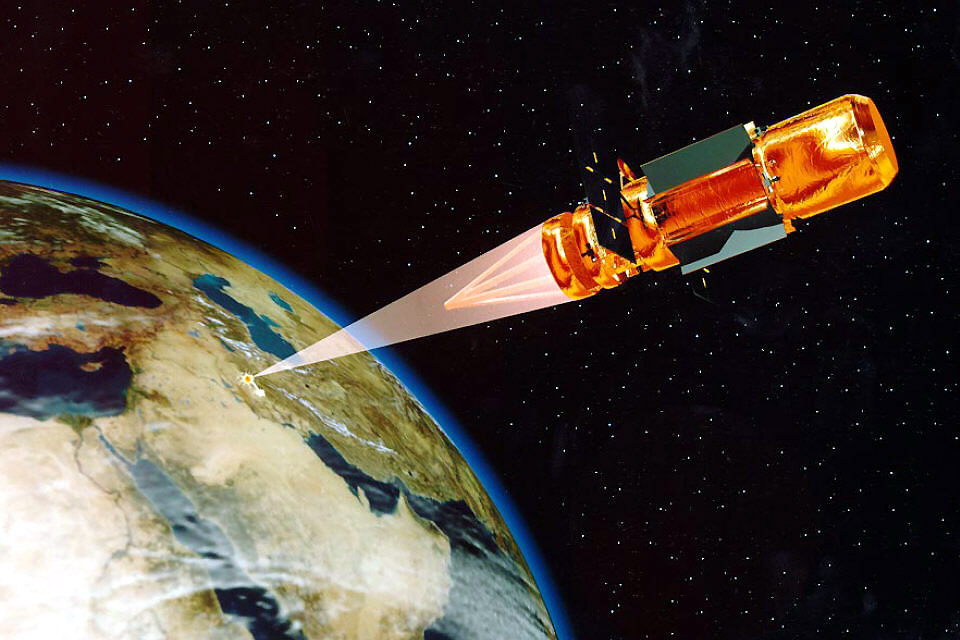
United States Space Command illustration of a conceptual space-based directed-energy weapon aimed at a precise target on Earth. Image: Wikipedia
The brief calls for the development of rules to promote the sustainability of outer space, specifically including rules for space traffic management, space debris removal, and space resource activities.
It also aims for negotiations on a treaty “to ensure peace, security, and the prevention of an arms race in outer space.” Lastly, and perhaps most importantly, it promotes the broadening of space governance to include national, civilian (with women prominent), and commercial representatives.
Also notable in the evolving landscape of international space cooperation are NASA’s Artemis Accords, which are bilateral agreements with space agencies from countries participating in the Artemis Moon-landing mission, and the CSIS Aerospace Security Project, which focuses on key areas like space debris mitigation, sustainability, and insurance for space activities.
The McKinsey Global Institute underscores the need for robust global space governance to prevent conflicts and sustain the space economy.
McKinsey identified five issues that could be have the greatest consequences in the emerging space economy: (a) disruptions of another space operator’s activities; (b) threats to space infrastructure and human space travelers; (c) use and sale of human-made space objects, resources, and intellectual property derived from space activities; (d) responsibility for damages caused in space or on Earth by space objects; and (e) sharing and exploiting data in a secure and equitable manner.
A paper entitled “Clearing the Fog: The Grey Zones of Space Governance,” published by the Centre for International Governance Innovation (CIGI) in November 2023, discusses the challenges we face in governing activities in outer space. The authors, Jessica West and Jordan Miller, explain that it’s not just one problem but a combination of tricky issues that will become more complicated as we use space in new and unexpected ways. They explore three interconnected challenges that make governing space difficult and argue that we need better rules.
The authors end by suggesting ways to make things clearer in these “grey zones” of space governance. In simpler terms, they want to define the rules for using space peacefully, make space activities and their potential problems more visible, and initiate discussions that involve different areas of governance.
The United Nations-sponsored 2024 Summit of the Future, to be held in September, aims for an international Pact for the Future by bolstering cooperation and peace initiatives, and its agenda prominently features discussions on space governance. These efforts may collectively ensure that space exploration serves peaceful purposes and benefits all nations, although the complexities, differing interests, and rapid technological developments pose ongoing challenges.
Space Governance and Regulations for Technology are Connected Issues
Advancing space governance requires addressing tech governance, since technological advancements determine space mission capabilities and responsible tech governance will help to ensure ethical and peaceful uses. Additionally, complex technologies used for space activities require frameworks addressing standardization, adaptation, interoperability, and intellectual property rights. Moreover, while technology enables space exploration, it can also add to risks like space debris.
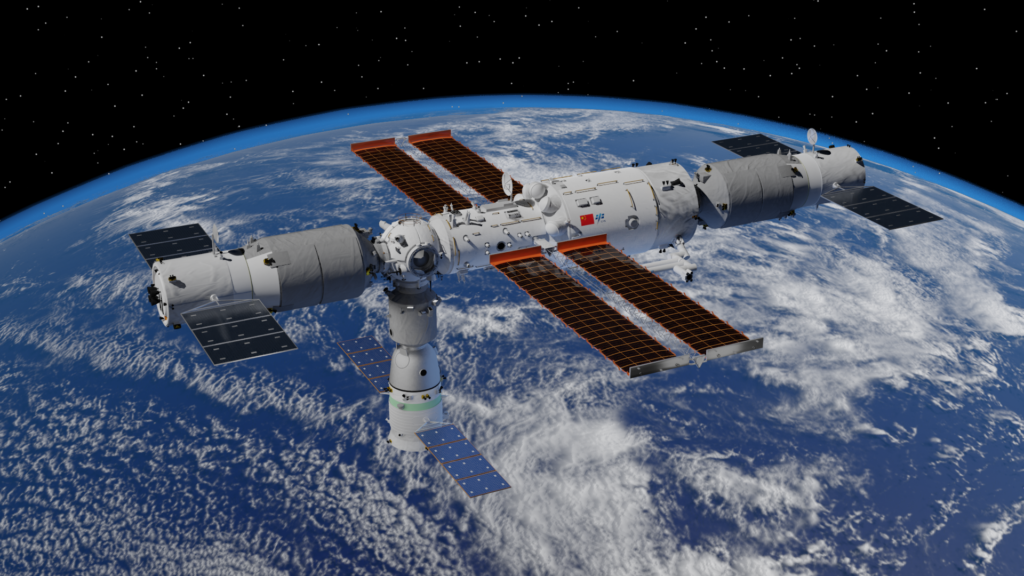
Tiangong (“Sky Palace”) Space Station is China’s permanently crewed space station. Image: Shujianyang
As humanity begins to regulate our ever-evolving technologies (and those who build and deploy them, on Earth or in Space), we can be like a child exploring a novel world and learning its perils, potentials, and consequences.
In the establishment of regulations over technology, including regulations on the use of AI such as the European Union is in the process of implementing, care is required to bring some order to a sometimes very disordered technological landscape. Without some order, planning for our technological future in space can be especially prone to risks and unpredictable outcomes.
There is increasing global concern for oversight of powerful technologies. Among the critics of the current state of disorder is cognitive scientist and technology commentator Gary Marcus, who wrote that “Critical national security questions should not be decided unilaterally by unelected tech leaders. Increasingly, they are.”
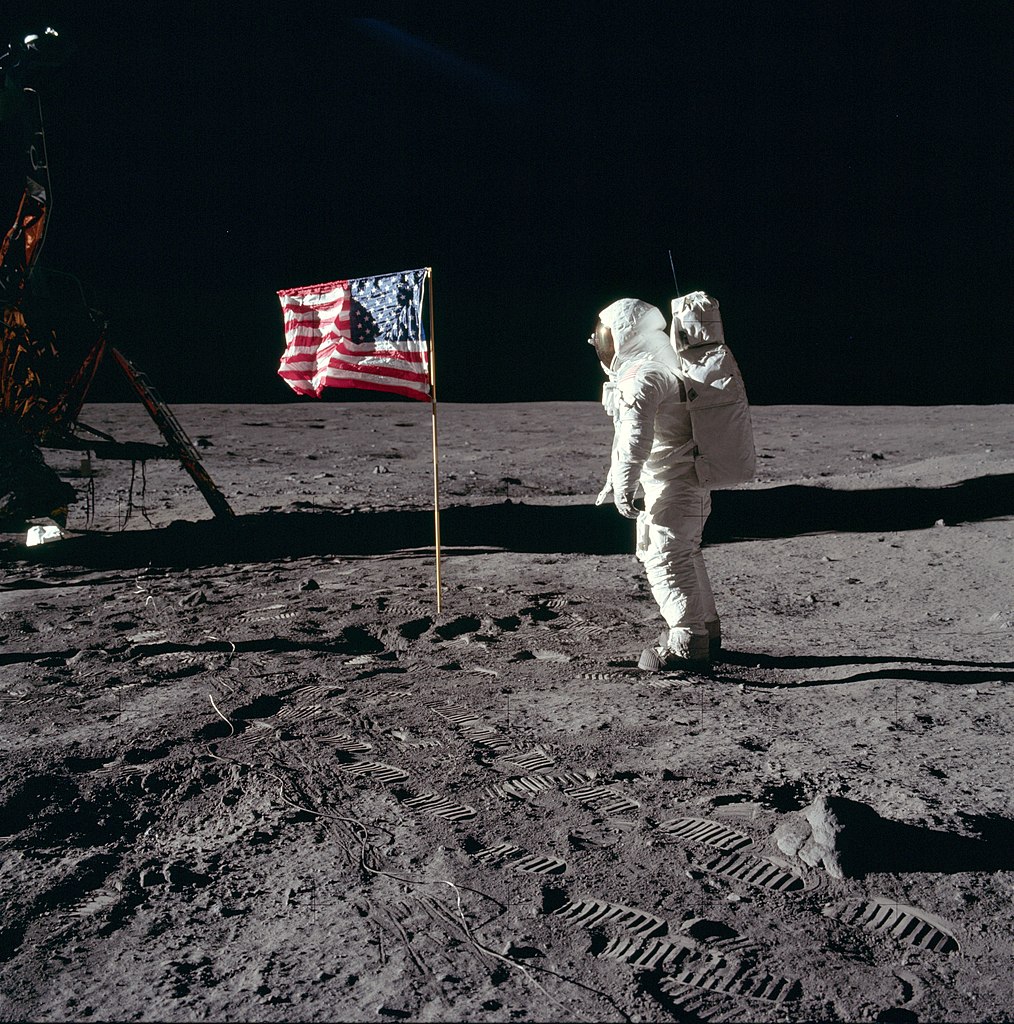
Regulation is needed where two or more parties have conflicting interests, especially in space – which no human or nation owns. The above photo features astronaut Buzz Aldrin, after planting the US flag on the Moon in 1969. Image: NASA.
Technology is rapidly expanding the human footprint in space.
As of 2024, space travel is on the rise, marked by increased frequency and technological advancements.
Companies like Virgin Galactic and SpaceX are at the forefront. SpaceX is reported to be planning 124 rocket launches this year, which is a substantial increase over the 98 it launched in 2023. NASA, too, is pursuing ambitious missions, including crewed trips around the moon. In 2023, Virgin Galactic had plans to sell space travel tickets at $450,000 per reservation, and its website promises “Space for the curious,” with exclusive events for paid astronauts who will be able to take home a custom spacesuit and wings together with photos and videos as mementos of their flights.
Of course, space exploration remains a complex and expensive undertaking, accessible primarily to astronauts and a few privileged individuals with considerable resources. However, as the prospect of everyday space travel holds promise for the future, and as Earth’s climate crisis intensifies, we need to remain mindful of leaders and behind the scenes influencers who are defining the emerging relationship between technology and space.
The future hangs in the balance.
Interested in exploring related topics? Discover these recommended TQR articles:
Searching For Martian Life with X-Ray Crystallography
Technology Fuels Advances in Citizen Science
Beyond the Binary: Can Machines Achieve Conscious Understanding?



